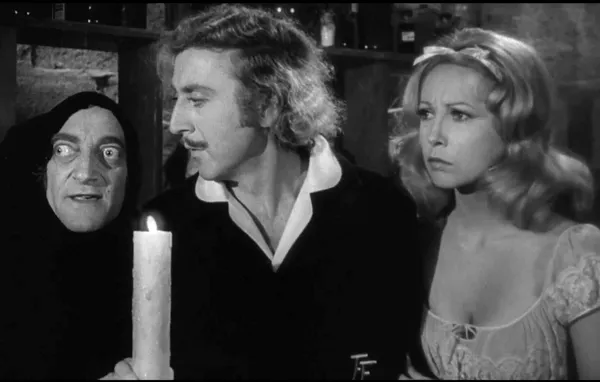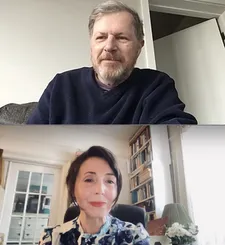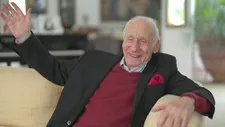By using well-chosen excerpts from the audiobook of Gene Wilder’s autobiography, Kiss Me Like A Stranger, Ron Frank lets Wilder himself guide us through the documentary, by positioning him in dialogue with many friends and colleagues assembled here (including Alan Alda, Carol Kane, Mike Medavoy, Alan Zweibel, Harry Connick, Jr., Burton Gilliam, Michael Gruskoff, Eric McCormack, Rain Pryor), most prominently Mel Brooks, who directed Wilder in a number of groundbreaking movies. We find out how the two met, because Anne Bancroft, starring at the time on stage in Bertolt Brecht’s Mother Courage (with Wilder as the Chaplain), was dating Brooks, who was looking for an actor to play Leo Bloom in what was to become The Producers. The two men clicked, as they both recall, over a pea coat and a joke.
It is great fun to revisit Gene Wilder’s remarkable performances from Arthur Penn’s Bonnie And Clyde to Woody Allen’s “remake of Sister Carrie with a sheep,” from The World’s Greatest Lover to The Frisco Kid. Before he became Wilder, young Jerome Silberman, growing up in Milwaukee, was shaped, so we hear, by what could have been a casual sentence by his mother’s doctor after she suffered a heart attack - namely that the little boy’s anger, if expressed at all, could kill her. Making her laugh was the way forward.
We learn about Gene’s love of Danny Kaye, how filming Willy Wonka went in Munich from Charlie Buckett actor Peter Ostrum himself, how Gene replaced Gig Young to save Blazing Saddles, and get to enjoy hilarious bloopers from the masterful Young Frankenstein, which inspired Tony McNamara’s screenplay adaptation of Alasdair Gray’s novel for Yorgos Lanthimos’s multiple Oscar-winning Poor Things. Wilder’s later years with Gilda Radner and then his wife Karen, the on-screen chemistry with Richard Pryor, and appearances on Will & Grace, until Alzheimer’s disease had its grip on the great “reactor,” as he called himself, round out the many aspects of a full life that gave the world a lot of joy.
From Denver, Ron Frank joined me on Zoom for an in-depth conversation on Remembering Gene Wilder.
Anne-Katrin Titze: Hello Ron, nice to meet you! Where are you?
Ron Frank: Nice to meet you! I’m usually in Connecticut, but right now I’m in Denver, visiting my daughter and son, they live here. Also we have a screening here at the Denver Film Festival tomorrow night.
AKT: A “combination of innocence and danger” is, I think, the first characterisation of Gene Wilder that we hear in your film. This same combination also characterises the best of fairy tales. He combines what people have been fascinated by for centuries. Does that make sense to you?
RF: It does. Gene, when people see him, his expression always seems to be like Gene’s hiding something. There’s something behind those eyes that he knows what’s going on, but you don’t know what’s going on. His character in Willy Wonka [& the Chocolate Factory, directed by Mel Stuart, 1971] really exemplifies that. It feels like he’s hiding something. You don’t know what he’s going to do, that’s what Peter Ostrum told us, Charlie in Willy Wonka.
AKT: In Stanley Donen’s The Little Prince - he is the perfect Fox (along with Bob Fosse’s Snake)!
RF: That’s true, sly and mysterious, absolutely. He’s like that in a lot of his films. He starred in Bonnie and Clyde first, but in The Producers with Mel Brooks who directed him, he was a bit of an open book and wore his emotions on his sleeve. But he goes through a transformation, something you would not necessarily expect with the character from where he starts and where he ends up.
AKT: The mystery and the unexpected! His film career really started with meeting Anne Bancroft and the play they were in together. What was his role in Bertolt Brecht’s Mother Courage [and Her Children]?
RF: It was a supporting role, it wasn’t a lead. I don’t know, I think he was a priest or a chaplain.
AKT: There is a Chaplain in the play.
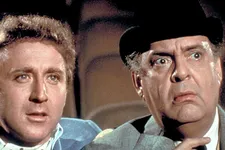 |
| Gene Wilder with Zero Mostel in Mel Brooks’s The Producers |
RF: And he befriended Anne Bancroft and got to meet Mel Brooks who was dating Anne at the time. It was Anne’s idea, she thought basically, here’s your Leo Bloom for that crazy movie you’re writing, Springtime for Hitler. The title obviously didn’t last very long. Because of the distributors, not because of Mel Brooks. They said it would look weird on a marquee. So basically Anne Bancroft introduced the two of them and Mel watched him carefully.
AKT: And it’s always good to have a pea coat.
RF: That’s the joke - we started the movie with that. Both Gene and Mel tell the funny story about Mel wearing a pea coat and he also called it a “urine jacket.” So they laughed and they hit it off.
AKT: Thank you for having that in the movie. I will never again be able to see a pea coat without thinking of Mel Brooks and that joke! I am also going to be thinking about Gene Wilder every time I am at the Plaza fountain. It’s probably the same for you?
RF: Oh that’s totally right. I used to live not far from there. Yes, we did a lot of shooting in New York and drove by there quite a bit. The fountain is about questions of fate and life. And that is actually how Gene opened his autobiography, talking about this story we use. Which way you go around the fountain could change your life. It’s seemingly arbitrary, maybe coincidental, but he believed in fate and making choices that will affect the rest of your life and living with that.
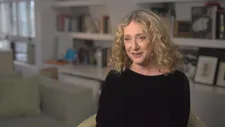 |
| Carol Kane on being cast in The World’s Greatest Lover: “Why would Gene Wilder be calling for me to be in a comedy?” |
AKT: Some of it has to do with casting choices. Gene replacing Gig Young in Blazing Saddles, for instance, and then later having Harrison Ford replace John Wayne.
RF: Yes, and Wilder’s last wife, Karen. He considered that a fateful experience too. Had he not written these parts of two deaf and blind people, Richard Pryor and Gene, he would never have met Karen, who was working at the Center for Hearing and Communication in New York. That’s how he met her and fell in love with her.
AKT: His name change - we only get a little bit of explanation that, well, he wanted to be wilder than Jerry Silberman. Is the choice a combination perhaps of Billy Wilder and Gene Kelly?
RF: Well, I don’t know, there’s a story behind that. His original name, as you know, was Jerome Silberman. From Milwaukee. When he was in acting school, he was about to do a presentation and they were going to introduce him as Jerome Silberman, and he thought, how was that going to look on a marquee? Jerome Silberman in Macbeth. It didn’t ring right. So he changed it to Wilder. The Wilder part I think came more from Thornton Wilder, the playwright.
AKT: That makes sense.
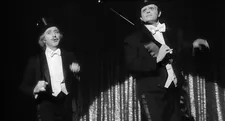 |
| Gene Wilder and Peter Boyle performing Irving Berlin's 'Puttin' On The Ritz' in Young Frankenstein |
RF: And the Gene part - he talks about this in analysis, but I don’t think it’s coincidental that his mother’s name was Jean, with a J. That was probably, maybe unconsciously, where that came from.
AKT: The mother’s influence seems to have been immense in relation to his anger, his constantly suppressed anger. The film mentions a doctor telling him as a boy, don’t make your ill mother angry, make her laugh. Or she will die! Which is really strong.
RF: Right. She had a heart attack when Gene was less than 11 years old. Maybe a little younger than that, eight, that’s when the doctor pulled him aside and said, don’t make her upset or you’ll kill her! Well, that’s a heavy burden for a kid to carry.
And Gene gives us the open analysis that from those words - and again it’s fate - how again just a few words can change your life. From those words expressions and bursts of anger would come out. You can’t keep it in, not all that time, and particularly when you’re a kid, so it came out in other forms. That’s what he suspects where all that volatility came from; where Mel says he could erupt like a volcano.
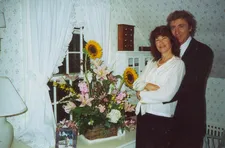 |
| Gene Wilder with his wife Karen Wilder |
AKT: Which we get to see sometimes on screen in the roles he played.
RF: Almost every movie that I’ve looked at, particularly his earlier ones, maybe not so much in his later ones, there are moments where he just goes over the top. And he was good at that. It was funny and not without reason in the script. It was always justified in one way or the other.
AKT: Have you seen Poor Things?
RF: No.
AKT: Well, Tony McNamara, the screenwriter of Poor Things, he said that he was inspired for the script by Fellini movies and Young Frankenstein.
RF: How about that! And Gene was inspired by Fellini, particularly when he did The World’s Greatest Lover.
AKT: He would have been a great silent movie face, absolutely. I think Carol Kane says it.
RF: Yes, he had the eyes for silent movies. Since they weren’t talking they expressed themselves with their eyes and Gene did that quite effectively in The World’s Greatest Lover, which he wrote and directed and starred in.
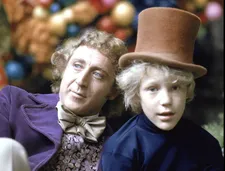 |
| Gene Wilder with Peter Ostrum in Mel Stuart’s Willy Wonka And The Chocolate Factory |
AKT: With Young Frankenstein and the bloopers you did a marvelous job editing. I was bursting out laughing a number of times. I hadn’t seen it in a while and it was wonderful to revisit. Are you still laughing at Young Frankenstein, even after making this movie?
RF: Oh yeah, I saw this movie in the theatre when I was a kid when it came out. I could not believe how funny it was. We were restricted by time in the movie, but I have to tell you what we really wanted to do is put more in. We left out for instance, when she says “you haven’t touched your food,” and he goes like this (Ron gestures with his hands). “There, are you happy now?” He had put his hands all over the food. We have the film now pretty much audience-tested and not all the jokes fly and are as funny as they are in context. I think for the most part we got the best ones.
AKT: The Puttin’ on the Ritz number controversy exposes Mel Brooks in an interesting way, too, when he said to Wilder “I wanted to see how hard you would fight for it.”
RF: That was the only time that they had a fight. Gene mentions in the book that they had a fight, though they very rarely fought; they loved each other, Gene and Mel. When they were writing Young Frankenstein they had an argument, not about the Ritz scene, it was something else, a big argument. Mel left and then ten minutes later he called Gene from his house and said “Who was that guy who was yelling in your apartment? That was totally wrong.”
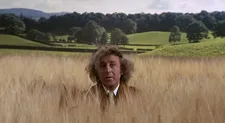 |
| Gene Wilder as the Fox in Stanley Donen’s The Little Prince |
It was Mel’s way of making an apology. He watched Gene carefully defend Putting’ on the Ritz. Mel wanted to be a traditionalist, he wanted to be faithful to the 1930s horror movies, where that obviously would not fit. But it was so absurd that it did fit. And Gene was right and Mel conceded as such; he thinks it was the best part of the movie. So it was victorious for both of them.
AKT: How was it for you to interview Mel Brooks?
RF: I have to tell you, I’ve been doing a lot of interviews with a lot of celebrities over my career for documentaries and Mel was probably the best. I mean, I was totally engaged and totally in love with the guy. He was 96 when he did this interview. I couldn’t hold a candle to his breadth and depth of knowledge. He is an American icon and a treasure and an amazing storyteller. We could have gone on, I could have done a film just with that interview alone.
I wish I could put more in it, but then it would be more about Mel than about Gene. But he was quite the storyteller. He said, I give you a half hour! We ended up speaking to him for more than an hour, the only thing that interrupted was a doctor visit. We were so happy and he was kind enough to tweet about it. He loves the movie, thankfully. 2.1 million hits looked at his tweet. Because he said “my dear friend Gene” and “don’t miss this movie.” He came to our LA premiere and introduced the movie. So Mel’s a deep friend and thankfully fan of this film.
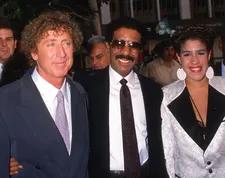 |
| Gene Wilder with Richard Pryor and his daughter Rain Pryor in Remembering Gene Wilder |
AKT: That’s wonderful. The structure of the film is so nice because of the audiobook reading with Gene’s voice. Audiences cannot be certain until the end credits. It’s not AI, we are kept wondering. You almost construct a new dialogue between Mel and Gene and the other interviews.
RF: That’s right. Gene wrote his autobiography, called Kiss Me Like a Stranger, and we were lucky enough to have an audiobook of it. We licensed the book and we wanted Gene to tell the story in first person. It’s a little different when it’s question/answer. This was him telling his story even though Gene is not with us anymore. We were able to select carefully what meant the most to Gene in terms of his storytelling.
Because he would tell the same story in many different interviews with Merv Griffin and British interviewers, so we knew what appealed to him and that’s what we focused on. And yes, through the editing I had them both, Mel and Gene and Gene and others, like Carol Kane, complement the stories. So they would tell stories in tandem, which is an effective way of storytelling.
AKT: Near the end in the images with Gilda Radner and his wife Karen, we see a lot of dogs. Did he love dogs? It’s not thematised, but did he write about dogs too?
RF: No not really. The first dog you see is Sparkle, that was Gilda’s treasured pet. I mean, Sparkle was everywhere; Gilda loved Sparkle.
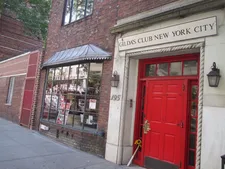 |
| Gilda Radner’s Gilda's Club in New York City |
AKT: That’s the Yorkshire Terrier?
RF: Yeah, I believe so, the little guy. And Sparkle outlived Gilda, so Gene took care of the dog afterward and lived in Gilda’s house, which she left for Gene. I guess they acquired more dogs after that with Karen. Always little dogs that he would hold. I would imagine that during Gene’s illness that that provided a tremendous comfort.
AKT: Another film that’s at the Oscars this Sunday is Maite Alberdi’s The Eternal Memory. It also deals with Alzheimer’s, dementia, and is a love story.
RF: I have not seen it.
AKT: You capture well both the the love story and the dementia near the end.
RF: Thank you. We didn’t want to dwell too long on it. It’s not the happiest moment of Gene’s life, of course, but it’s an important part and sadly a harder part for Karen who told us that this almost killed her, taking care of Gene the way she had to. It does exemplify the love that she had for her husband. They were very very much in love.
AKT: A very full life and a very full film. Thank you so much.
RF: Thank you so much! Are you in New York?
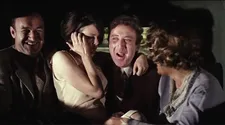 |
| Gene Wilder with Gene Hackman, Evans Evans and Estelle Parsons in Arthur Penn’s Bonnie and Clyde |
AKT: I’m in New York.
RF: It sounds like you could be from Germany?
AKT: I am.
RF: So is my family.
AKT: Where in Germany?
RF: My mother was from Berlin and my father was from Chemnitz. Do you know Chemnitz?
AKT: I’ve never been there.
RF: This was Eastern Germany. I’ve been there quite a lot and filmed there. I’ve done some movies in Chemnitz years ago.
AKT: Did you show your Gene Wilder film in Germany?
RF: Actually the town of Chemnitz is doing a sort of gathering of descendants of refugees - my family, we’re Jewish, and refugees from Chemnitz, so they’re doing a gathering of descendants and they’re asking me to show it. Once I clear it with my distributor, we’re probably going to do a screening there.
Remembering Gene Wilder is in cinemas in the US.








